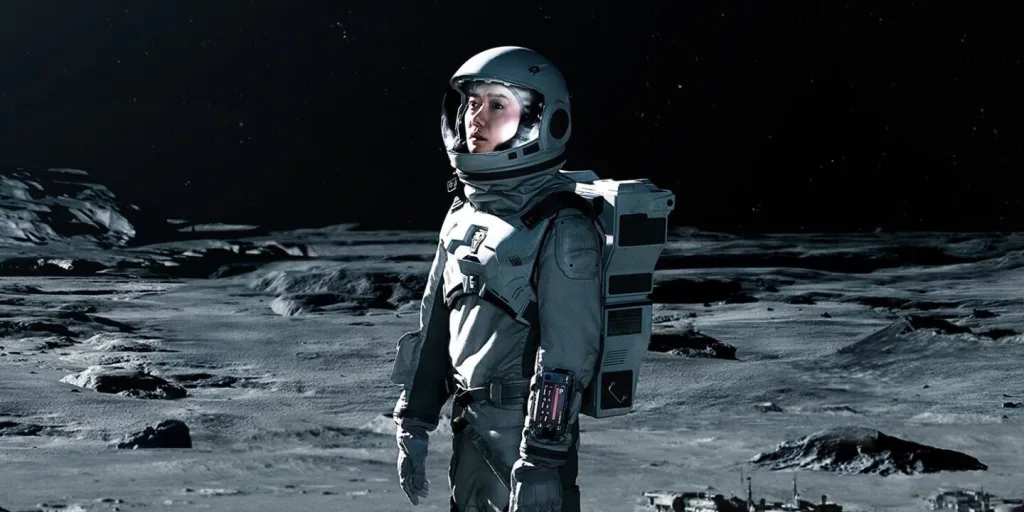
This is a full season review and contains spoilers for the whole drama, including the ending
Concerned with big picture social issues like water shortages and corporatism, The Silent Sea is a high concept science fiction drama with a sparse and filmic quality.
Based on a 2014 short film, The Sea of Tranquility, the big budget series adaptation clearly draws on its cinematic roots. With an all-star cast including acting heavyweights, Bae Doona and Gong Yoo, The Silent Sea is the most mainstream of all the science fiction offerings I’m reviewing; being more like an American film feature than a Korean drama.
The drama is beautiful and atmospheric with high production values and wonderful performances from some of Korea’s finest actors. But like a lot of other high budget speculative fiction, the story itself is sparse and stretched and in some places overly derivative. From Aliens to Doctor Who, the story draws on previous narratives in ways that are sometimes subtle and at other times far too obvious.
Like a film, The Silent Sea is trying to make its audience feel more than think. Although its messages are there, they’re less important than the emotions it’s trying to evoke. Fear. Claustrophobia. The existential fear of emptiness. The grief of still being alive in a dying world. The impotence of screaming into the void. And the complicated hope and fear that comes with humanity’s eventual evolution that we will need to survive.
Like Alien and it’s influential sequel, Aliens, The Silent Sea examines the clash between a humanity out of its element and alien life that’s completely different to anything that exists on Earth.
From a distance, the sea looks tranquil and silent just like space looks tranquil and silent. But viewed up close it is teeming.
Note: With the original short film not available for streaming, it’s hard to see what this looked like as a shorter piece of fiction, which is a shame. I for one would have loved to have done a comparison between the two.
The plot
On a future Earth ravaged by climate change-induced desertification, scientists are desperately searching for a new source of water. What we see of Earth’s economy shows it to be a brutally-hierarchical corporately-run dystopia where access to water is determined by status.
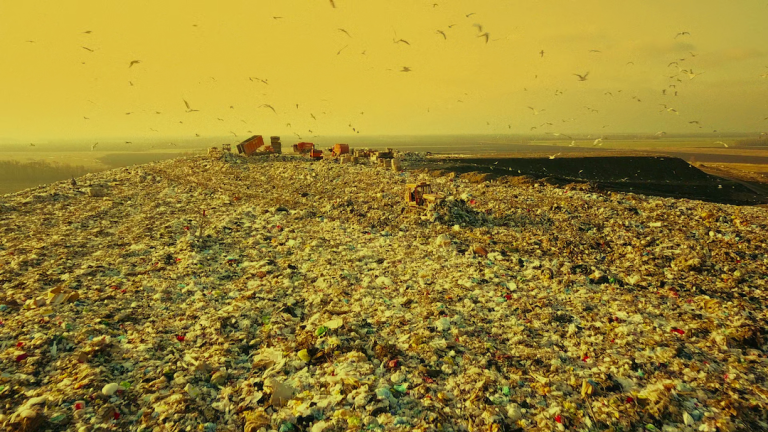
Song Ji-an (Bae Doona) is an ethologist whose sister died in mysterious (read: classified) circumstances at Balhae Station on the moon five years ago, along with 117 others. It’s a disaster that’s been immortalised but Ji-an believes there’s more to the story. After the ‘Environment for Human Survival Research Centre’ loses contact with Balhae Station, Ji-an joins an expedition led by Captain Han Jun-jae (Gong Yoo) to the station to investigate.
There they find themselves in a quintessential base-under-seige horror film as their colleagues start drowning by the waterless sea.
What lies beneath
There’s nothing in space
Song Ji-an: The Silent Sea episode 1
As a production, The Silent Sea is beautiful and mesmerising in its simplicity. The stark lines, muted colours and minimalist score work perfectly to emphasise the loneliness and emptiness of space, the vast distances of the surrounding vacuum, and the dense, sterile and confined aspect of the station itself.
The characters are similarly self-contained, with austere performances from everyone involved. From the first scene, all our characters are trapped: in their own lives; in a dying world; in space suits; in the station itself; and finally in their own bodies as the pathogen destroys them at the cellular level.

This feeling of being trapped engenders a growing sense of claustrophobia as the show’s suspense is ramped up over the first half. Characters run around the space station but, with the ship scuttled and communications down, their desperate, frenetic action becomes almost meaningless. And even if they were to escape, what is it they’re escaping to? A parched, desolate dystopia is all that awaits if they don’t bring back a solution to Earth’s water shortages.
The characters – like space, like the Moon, like the base and like the Sea of Tranquility itself – are calm on the surface but teeming underneath. From a distance, Bette Midler sings, there is harmony. From a distance, the Earth is blue and green and people kind and nobody struggles. The moon is a rock, space is a vast empty void, the station is sterile and lifeless, and all the people around us are professional and honest. But get too close and life in all its myriad wonder, danger and menace will rear up.
There’s desperate struggle under this silent sea. The ongoing struggle for survival that is life itself.
As a theme, this is very well developed and probably the show’s best quality. The Silent Sea is never confused about what it wants to say and it has the budget to say it well. It’s instead in the finer points of the plot that the show starts to falter.
And with parts of the drama heavily derivative and other parts told only in shorthand, it’s in the trees rather than in the forest, that the show’s flaws lie. From a distance, in fact, the drama itself looks great. It’s up close that you start to see the cracks.
Influences or plagiarism? The Doctor Who controversy
It’s uncertain the extent to which The Silent Sea was influenced by other works or not. Some influences – like the 1986 sci-fi horror film, Aliens – are clear. From the base-under-seige horror vibe, the strong female lead, the discovered child that needs to be protected, and even the inclusion of a corporate spy in the expedition to retain intellectual property at the expense of people’s lives. The drama’s callbacks to the iconic film are obvious.
But the big question to anybody watching The Silent Sea is whether those involved meant to draw so heavily on the 2009 Doctor Who special The Waters of Mars. If deliberate, the first half is shamelessly derivative – borderline plagiarism if such a thing can be established in visual media. If not deliberate, then is it just a strange coincidence that the drama’s first half recycles almost entirely the plot of that particular special?
Don’t drink the water. Don’t even touch it. Not one drop
Adelaide – Waters of Mars
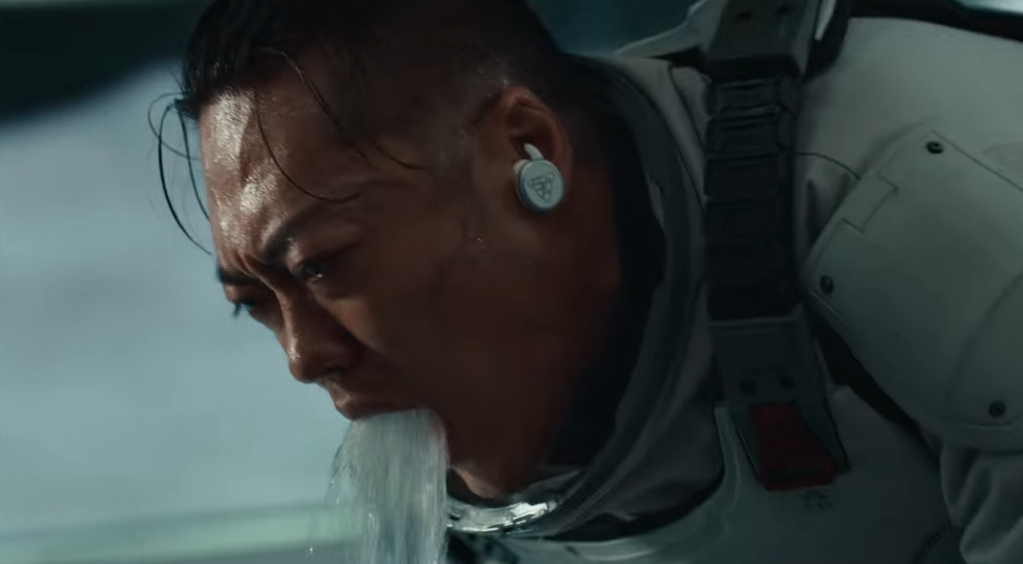
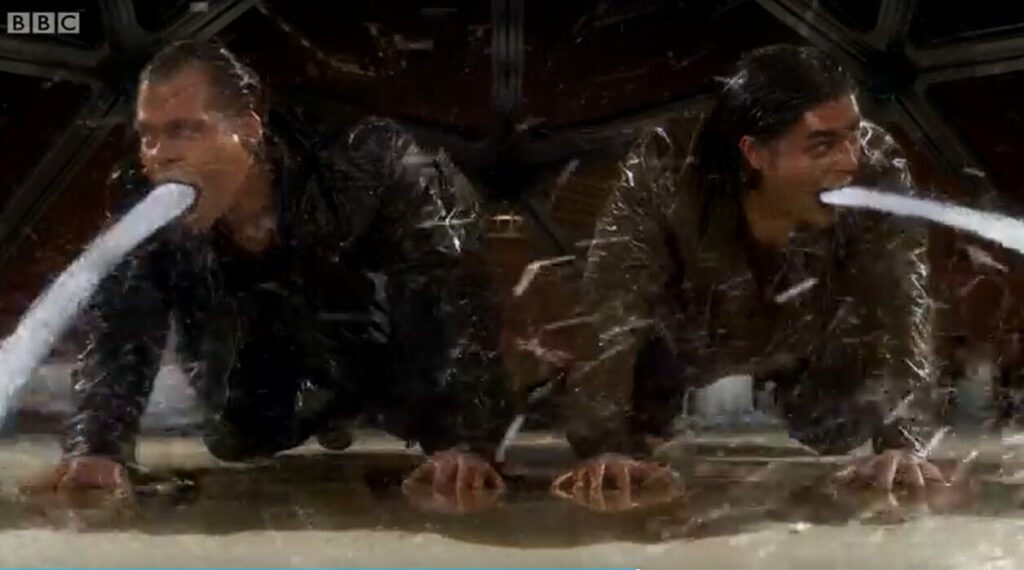
In The Waters of Mars the Doctor finds himself on a Mars space station where the crew are slowly being consumed by some kind of sentient water that’s trying to reach Earth. It is these elements – the closed base horror, the sentient water, the idea of a lifeform buried beneath the surface of a seemingly dead planet – that The Silent Sea uses openly. But the drama’s channelling of The Waters of Mars is not just in plot points but in its use of visual imagery.
While the show’s Aliens references seems more like homage (or just an embrace of established tropes that Aliens itself drew on), its Waters of Mars imagery is blatant and overt. Doctor Who fans were incensed and many accused the writer of simply repackaging the earlier story. As I’m unable to see the original film, I don’t know the extent to which this was in the source text or added by the writers of the adaptation. But since Waters of Mars aired in 2009 and Doctor Who has a large fan base in Korea, it’s hard to believe the writers and producers weren’t aware of it.
In the drama’s defence, the Waters of Mars component of the storyline is squarely in the first half. As the show progresses, the similarities between the two are less overt and the final episodes bear no resemblance to it (other than the idea of alien life being hidden in a resource that humans need to live).
The Ending

In my opening paragraph, I called the plot of The Silent Sea stretched and that’s definitely the show’s weakest point. Characters run around ill-lit corridors and there’s several diversions around mechanical faults that are clearly there to fill time. While the slow pacing works to build tension, after a while it becomes a bit boring. At least half of the show could be jettisoned with no impact on the overall story.
Apropos of almost nothing, characters spend a lot of time in darkness and as a fully paid-up member of the Society for Making Television Visible Again, I tender The Silent Sea as yet another modern piece of storytelling that would benefit from the viewers being able to see the damn thing.


As the show was based on a film, a lot of the characterisation and plotting is told in a filmic way with motivations hinted at and plot points glossed over for full emotional impact. But while I hesitate to ever be seen advocating for exposition, as an eight episode drama, the writers had the runtime to pencil in some of the smudged outlines.
It’s not that the drama doesn’t make sense entirely, it’s that you’re left with the impression that it would if you just had a bit more information.
In the original Sea of Tranquility, I believe that the person still alive on Balhae Station turns out to be Song Ji-an’s sister. This explains one of the more jarring parts of how the plot unfolds. The whole first half builds up to what is obviously going to be the revelation of Ji-an’s sister still being alive. And then it turns out she isn’t.
Instead, in line with the Aliens homages, we’re given a Newt-type character for Ji-an to care for and protect.
A genetically engineered experiment, Luna073 is an attempt by scientists on Balhae Station to create a human capable of surviving contact with the Lunar water. They succeed. But when the government decides the project is too much of a risk, they shut it down, leaving everybody to be hoist by their own experimental petard.
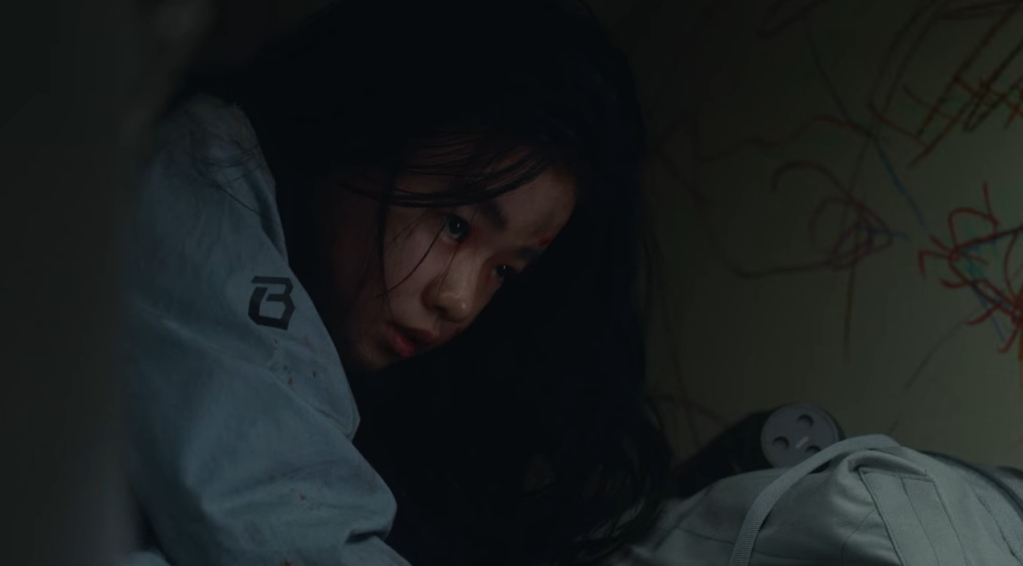

Of course, in one sense the experiment is successful. Luna073 can survive on the Lunar Water. But it’s also changed her significantly, giving her physical and behavioural differences that are notably not human.
There are two ways for a species to survive a drastic climatic change. Migration and evolution. But with the whole of Earth being affected by anthropogenic global warming and the changes happening too fast for normal adaptation, humanity is faced with a stark choice.
Perish or artificially evolve.
If we manage to survive, will we even be human anymore? And what does that mean when humanity is what destroyed our world in the first place?
I don’t know which species is worse. You don’t see them fucking each other over for a goddamn percentage.
Ripley on capitalism, Aliens
After all, it’s not just Lunar water killing people on Balhae Station. Most of the show’s deaths comes from people killing people, humans slaughtering humans. The horrible painful death of drowning while your organ’s liquefy might be more existentially disquieting but is it worse than your own government sealing you into a moon base or one of your colleagues betraying you for money?
At the end of The Silent Sea, abandoned by their own people and trying to protect Luna073 from being sold to a corporation for more experimentation, our surviving characters run to escape the base that is flooding with deadly water.
They end up on the surface of a barren moonscape with Earth signalling faintly in the distance. Footprints in the soft dirt lead to a small hill where Luna stands, without a space suit. She’s completely adapted to a vacuum.
Humanity free from its physical restraints.
But did we win or did the viral water win?
And is there really any difference between the two?
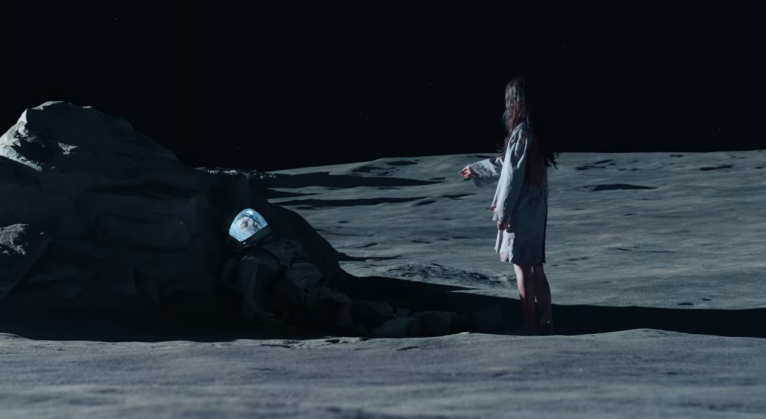
The Silent Sea is available to stream with English subtitles on Netflix



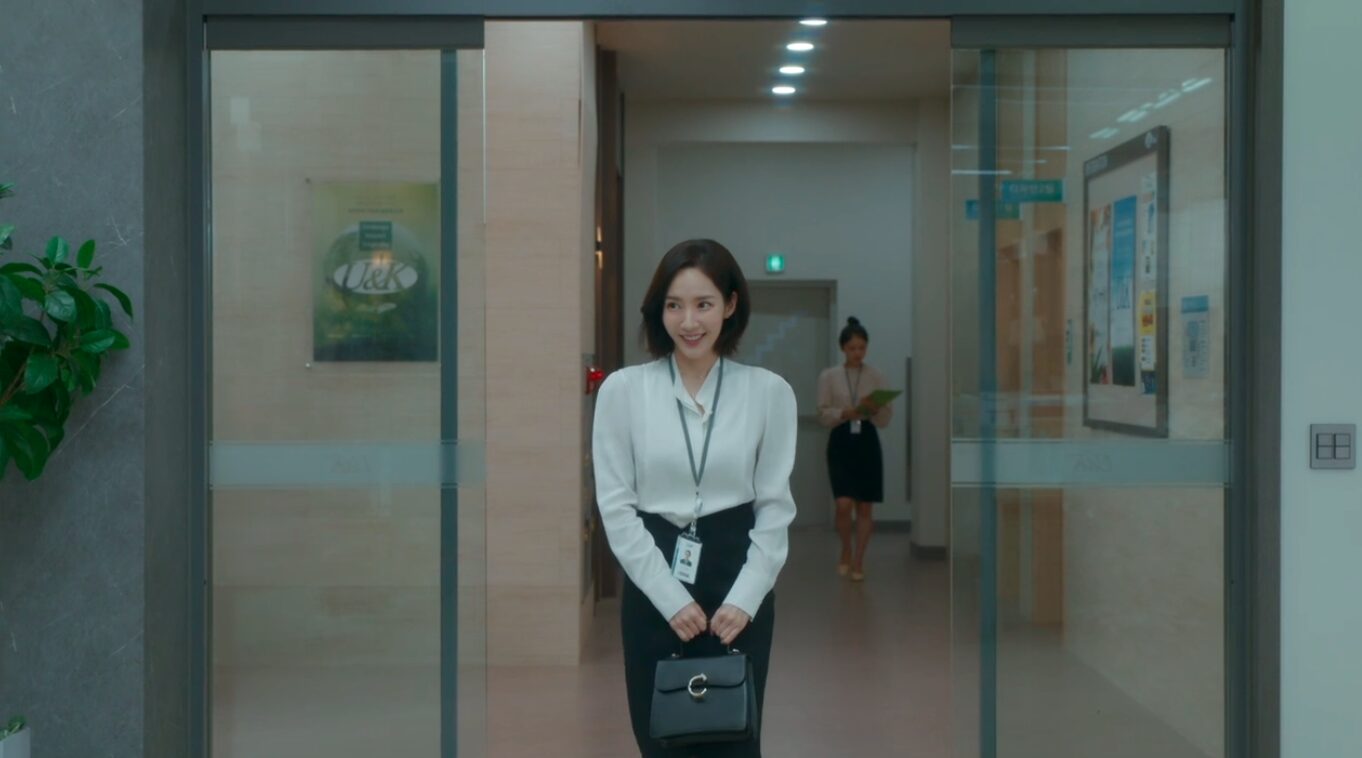
4 thoughts on “Korean sci-fi: The Silent Sea review”